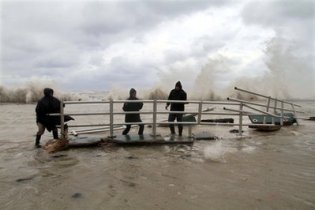 BEIRUT – Heavy rains and fierce winds pummeled countries across the Middle East over the weekend, sinking a ship off Israel’s coast and killing a woman in Lebanon whose car was crushed when a tree fell on it.
BEIRUT – Heavy rains and fierce winds pummeled countries across the Middle East over the weekend, sinking a ship off Israel’s coast and killing a woman in Lebanon whose car was crushed when a tree fell on it.
The storm brought unusually cold temperatures, below freezing in some spots. It ended weeks of unseasonably warm and dry weather that contributed to dozens of forest fires in Lebanon and helped feed a massive blaze in Israel that destroyed thousands of hectares of forest.
It whipped up sandstorms in Jordan and Egypt, which closed its largest Mediterranean port. In Syria, snow blanketed the streets of Damascus for the first time this winter. Schools sent students home early and children ventured outside to play in the streets.
Syrian authorities closed their main port of Tartous. In Egypt, 12-foot waves forced shut the port of Alexandria — the country’s largest — as well as another in the town of Nuweiba along the Red Sea coast of the Sinai Peninsula.
Heavy rains flooded the streets in Beirut and snow forced some road closures in remote mountain towns in Lebanon. A woman died Saturday night when an uprooted tree fell on her car in the northern port city of Tripoli, authorities said. Flights in and out of Beirut’s international airport were delayed.
Off the Israeli coast, a Moldovan cargo ship sank in stormy weather about seven miles (11 kilometers) off the port city of Ashdod, and a Turkish ship was safely towed two miles to shore after sending out distress calls.
An official from Israel’s shipping and ports authority, Yigal Maor, said the Moldovan vessel’s 11-member crew scrambled onto lifeboats and was rescued by a nearby Taiwanese ship. The Israeli military said its sailors arrived safely ashore.
The storm briefly disrupted operations at Israel’s Ben-Gurion Airport. Spokesman Adar Avisar said two flights — one each from British Airways and Lufthansa — were diverted to Cyprus in the afternoon. By evening, their passengers were on their way to Israel. Departing flights were also delayed for about an hour in the afternoon, Avisar said.
Elsewhere in Israel, rain and hail pounded the country while strong winds toppled trees and traffic lights, flooding streets and knocking out electricity to hundreds of homes. Local media reported that a pier at the ancient port city of Caesarea collapsed, a breakfront at another beach cracked and towering waves washed over the shore of Eilat, a Red Sea port city.
Police spokesman Micky Rosenfeld said northern Israel was hit hardest by the storm, and that extra police patrols were dispatched to divert traffic because of downed trees. Two police officers were lightly injured when a tree fell on their patrol car, Rosenfeld said.
In the Gaza Strip, strong winds and lashing rains caused cracks in the pier and the breakfront at the harbor local fishermen use. No one was hurt, but civil defense workers and the Gaza maritime police were hauling boats out of the water and moving them and other fishing equipment to safer ground.
Egypt was hit by rain and winds up to 37 miles (60 kilometers) per hour in Alexandria on the northern Mediterranean coast.
Sandstorms blanketed Cairo for a second day Sunday, choking the air with dust and turning the sky a tepid beige. Doormen and shopkeepers tried in vain to keep the swirling dust at bay, sweeping sidewalks and dusting off parked cars.
Jordan also wrestled with sandstorms kicked up by winds up to 55 miles (90 kilometers) per hour, police said. Visibility was severely limited, and authorities closed major highways in the eastern desert linking the country with neighboring Iraq and southern roads leading to the ancient city of Petra, a major tourist attraction.
A police statement said low visibility caused a 10-car pileup in a district south of the capital Amman, which injured 16 people.
Cairo airport remained open while Amman airport reported up to two-hour delays in domestic and international flights.




